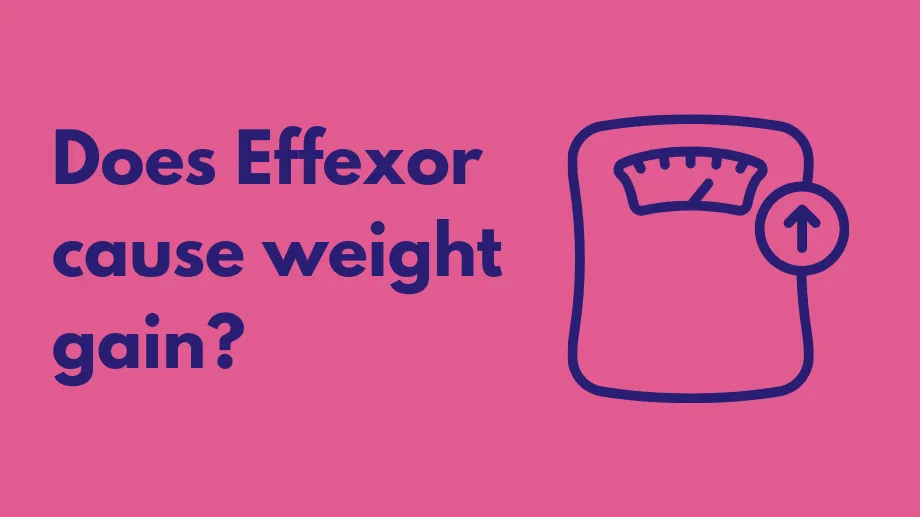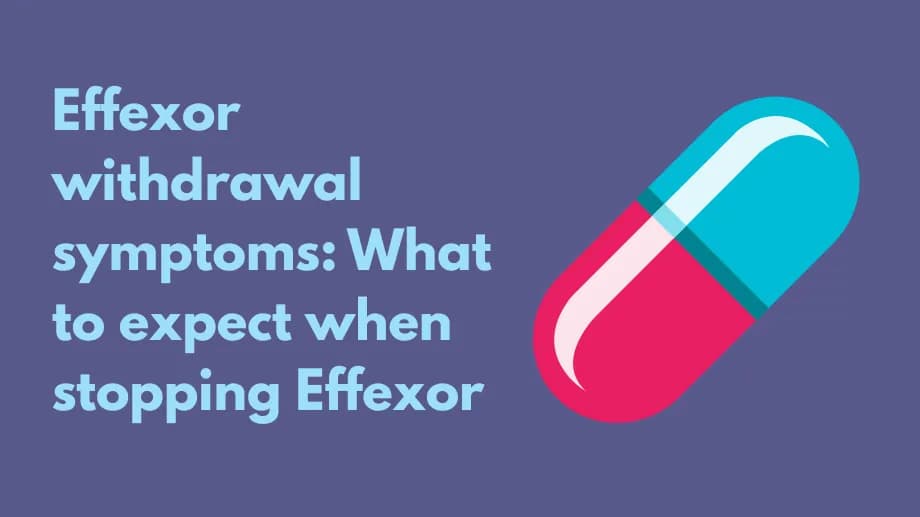Does Effexor cause weight gain?

When starting a new medication, you may be worried about how your body may react and how it may affect your appetite and body weight. Antidepressant medications such as Effexor have long been associated with certain side effects including significant weight gain. It is, however, less likely to cause weight gain when compared to older classes of antidepressants like tricyclic antidepressants and monoamine oxidase inhibitors (MAOIs).
Studies have shown that some of the newer antidepressant drugs may be associated with weight gain. In one clinical study, Effexor was associated with weight gain, along with Celexa (citalopram), Remeron (mirtazapine), Lexapro (escitalopram), Zoloft (sertraline), and Paxil (paroxetine). In this study, people on Prozac (fluoxetine) did not see a significant weight change. Wellbutrin (bupropion) is another antidepressant that is known to have a lower risk of weight gain and may even contribute to weight loss.
The data from other studies showed mixed results. Some studies show that patients treated with Effexor gain a significant amount of weight, while other studies show that weight gain from venlafaxine is small and possibly insignificant.
Some people may actually lose weight while on Effexor. It was a side effect that has been reported since the drug came onto the market. Weight loss was also reported in pediatric patients ages 6 to 17 years during clinical trials.
So although the risk of weight gain on Effexor varies among individuals, there are ways to manage this. Increased physical activity and maintaining a healthy diet can help you prevent further weight gain while taking Effexor.
Effexor FAQs
What is Effexor used for?
Effexor is an oral serotonin-norepinephrine reuptake inhibitor (SNRI) that is available in several different formulations. It is approved by the FDA to treat adults with:
- Major depressive disorder (MDD)
- Panic disorder (PD)
- Generalized anxiety disorder (GAD)
- Social anxiety disorder (SAD)
Although not approved, Effexor is sometimes used off-label to treat attention-deficit/hyperactivity disorder (ADHD), fibromyalgia, diabetic neuropathy, chronic pain, hot flashes, migraine prevention, post-traumatic stress disorder (PTSD), obsessive-compulsive disorder (OCD), and premenstrual dysphoric disorder (PMDD).
How does Effexor work?
Effexor (venlafaxine) is a type of antidepressant called a serotonin-norepinephrine reuptake inhibitor (SNRI). It works by raising the activity of neurotransmitters in your brain, specifically serotonin and norepinephrine. It is believed that maintaining proper levels of serotonin in your brain prevents depression and anxiety, and it is thought that increasing norepinephrine levels reduces nerve pain.
What drug interactions are there with Effexor?
When Effexor is taken with other drugs, it can change how they work or make some side effects more likely or severe. You should ask your healthcare provider if any of the prescription medications, over-the-counter (OTC) meds, vitamins, or supplements you take may interact with Effexor, including:
- Monoamine oxidase inhibitors (MAOIs) such as isocarboxazid, linezolid, methylene blue, phenelzine, tranylcypromine, and selegiline
- Selective serotonin reuptake inhibitors (SSRIs) such as citalopram, escitalopram, fluoxetine, and sertraline
- NSAIDs such as ibuprofen and naproxen
- St. John’s wort
- Warfarin
- Lithium
- Tramadol
- L‑tryptophan
What are the side effects of Effexor?
The most common side effects of Effexor include:
- Nausea
- Sleepiness or drowsiness
- Dry mouth
- Constipation
- Sexual side effects
- Loss of appetite
- Sweating
Other possible side effects of Effexor can include:
Shop Medications
- Unusual dreams
- Diarrhea
- Trouble sleeping
- Yawning
- Tremor or shaking
- Dizziness
- Headache
- Blurred vision
- Feeling anxious, nervous, or jittery
- Increased heart rate
- Weight gain or weight loss
Rarely, Effexor may cause some more serious side effects such as:
- Serious allergic reactions with symptoms such as:
- Hives
- Swelling of your face, tongue, or throat
- Shortness of breath
- Increased risk of suicidal thoughts and behaviors. Notify your healthcare provider immediately if you notice new or worsening symptoms of depression, suicidal thoughts, or behavior, especially during the first few months of treatment or when your dose changes.
- Serotonin syndrome, especially if taken with other medications that affect serotonin levels in your brain. Symptoms include fast heart rate, sweating, muscle stiffness or spasms, fever, and confusion. Seek immediate medical attention if you experience these symptoms.
- A sudden decrease in blood pressure and fainting. Tell your healthcare provider if you experience dizziness often while on Effexor.
- Increased risk of bleeding. Notify your healthcare provider if you have bruising that does not get better, black-colored stools, pink or red urine, or unusual bleeding from your nose or gums.
- Manic episodes if you take Effexor and have bipolar disorder. Talk to your healthcare provider right away if you notice unusual changes in your behavior.
- Glaucoma. You should have an eye exam before beginning Effexor. Call your healthcare provider if you have eye pain, swelling, redness, widened pupils, or vision changes (such as seeing rainbows around lights at night).
- Hyponatremia (low sodium levels), with symptoms such as:
- Confusion
- Headaches
- Dizziness and fainting
- Seizures
- Coma
- Lung problems. Notify your healthcare provider right away if you experience trouble breathing, cough, or chest pain/discomfort.
- Withdrawal symptoms if you suddenly stop taking Effexor, including:
- Agitation
- Anxiety
- Fatigue
- Confusion
- Mood changes
- Dizziness
- Headache
- Diarrhea
- Seizures
- Sexual dysfunction including a decreased sex drive
Disclaimer: These are not all of the possible side effects of Effexor. Contact your healthcare professional for medical advice about any possible adverse effects you experience while taking this medication. You can report your adverse effects to the FDA at 1-800-FDA-1088 or www.fda.gov/medwatch.
Who should not take Effexor?
When taken as directed, Effexor is generally well-tolerated and safe. However, some people should not take this medication. Effexor should not be taken if you have an allergy to venlafaxine, desvenlafaxine, or any inactive ingredients in that particular product. You should also avoid this medication if you have taken a monoamine oxidase inhibitor (MAOI) in the last 14 days.
What should you tell your healthcare provider before using Effexor?
Your healthcare provider should know any other medical conditions you have before starting Effexor such as:
- Family history of depression, suicide, mania, hypomania, or bipolar disorder
- High blood pressure or other heart problems such as stroke or heart attack
- Bleeding problems
- Glaucoma
- High cholesterol or triglycerides
- Kidney disease
- Liver disease
- History of seizures
- Low sodium levels in your blood
- Lung problems
- Alcohol use
- Pregnancy or plans to become pregnant (Effexor may harm your unborn baby)
- Breastfeeding or plans to breastfeed (this medication may pass into your breast milk and harm your infant)
Which antidepressants cause the most weight gain?
Weight gain is among the reported side effects of antidepressant medications. While everyone’s response is different, some antidepressants are more likely to cause weight gain than others. According to one study, the antidepressants with the highest risk of causing weight gain are:
- Citalopram
- Amitriptyline
- Mirtazapine
- Trimipramine
- Nortriptyline
- Phenelzine
- Paroxetine
Which antidepressants are associated with weight loss?
Most antidepressants are more commonly associated with weight gain, but there are several that may cause weight loss. While the research has shown mixed results, bupropion, fluoxetine, and duloxetine are three antidepressants that are more likely to help you lose weight.
How can I lose weight while on Effexor?
If you have gained weight after starting Effexor, it is important you don’t just stop taking it. That can be dangerous and cause some serious side effects. Untreated depression is also dangerous. Instead, there are several ways to maintain a healthy weight, including:
- Change your medication to one that has a lower risk of weight gain
- Eat a healthy, balanced diet
- Increase your physical activity
- Get a good night’s sleep
- Cut out alcohol if you regularly drink
Related Medications
- Pristiq (desvenlafaxine ER)
- Cymbalta (duloxetine)
- Savella (milnacipran)
- Fetzima ER (levomilnacipran ER)


